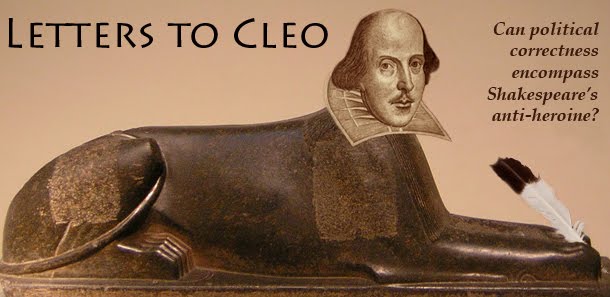I think the news is out about the Actors' Shakespeare Project's Antony and Cleopatra, so I don't really feel the need to pile on the production - but there are some important critical points to be made about it, so here goes nothing. In a way, it stands as simply another attempt by ASP (I know, an acronym so appropriate to this particular script!) to tackle a play it doesn't really have the cast for with smarts, some nifty lighting effects, and a lot of scrappy attitude. This time the casting question was particularly acute, however, given the complexity of the two leads (widely assessed as among the most complicated characters in all of Shakespeare). The word around town was that A&C was chosen in part to give company stalwart Paula Plum a role she'd long coveted. And I don't blame her; I'd like to play Cleopatra, too. But not everyone is right for every role - not even local stars as talented as Ms. Plum.
The problem is hardly that Plum's "too old" for the role (as one outraged commenter on this blog claimed); nor is it that she can't muster the mature sexiness to launch (or rather sink) a thousand ships; the lady is still hot, thank you very much. It's simply that Plum is too trustworthy a presence, too solid an emotional citizen, to conjure Cleopatra, who "makes hungry where she most satisfies" precisely because her "infinite variety" conceals an inner void that she's hungry to fill herself. In short, Cleopatra is not so much a personality as a performance, and Shakespeare's play not so much a celebration of her allure as a devastating critique.
All this seems to have been lost, however, on director Adrianne Krstansky, who has slashed the text by more than a quarter (it seems half the first half is missing), to focus, it would seem, on Cleo and Tony's notoriously naughty love affair at the expense of those boring political machinations back in Rome. The trouble is that without those boring political machinations, the context for this power couple's self-indulgence is missing, and the play becomes a simplistic tirade against the "masculine" political state - rather than an exquisite balancing act between two equally flawed modes of gender.
 |
Paula Plum and James Andreassi as Antony and Cleopatra. |
Thus in the end, what's special, and deeply intriguing, about Antony and Cleopatra - its status as one of the "problem" tragedies - went missing. Many people are aware that Shakespeare's comic output, after the glory years of Much Ado, As You Like It and Twelfth Night, turned darker, and intellectually knotty, with works like Measure for Measure and All's Well that Ends Well. What fewer realize is that the same pattern held for the tragedies: after the "Big Four," you can feel Shakespeare pushing and pulling at the tragic form: he freights the heroes of Antony and Cleopatra with perhaps more equivocal feeling than the mode can bear, while Troilus and Cressida plays as half-satire; then for the first time the Bard gives the hero of Coriolanus no inner voice whatsoever - and finally, perhaps inevitably, Timon of Athens is just an abandoned first draft.
Of this motley group, A&C is certainly the most suggestive and successful. Nevertheless, to call its tone "tricky" is an understatement: for throughout the play, Shakespeare seems to be almost willfully tearing at the tragic status of his heroes; in moral terms they deflate, and then re-inflate, from scene to scene - and while the Bard had previously risked making a tragic "hero" evil (in Macbeth), he'd never built a play around people who are in some ways contemptible. Indeed, Antony and Cleopatra finally die, after a brilliantly managed political and emotional decline, in a manner which flirts constantly with the ridiculous (tellingly, Cleopatra is brought the fatal asp by a "clown"), yet fails utterly if it is played for laughs. I'm not pretending this mysterious, ambivalent atmosphere (similar to that of late Chekhov, in a strange way) is an easy thing to pull off; in fact I've never seen a really successful production of Antony and Cleopatra; still, that's the gauntlet the play throws down to any company that attempts it.
It's a gauntlet, however, that our current political moment perhaps prevents a company from ever picking up. You could feel throughout this production a desire to flatter and forgive Cleopatra as some sort of pre-figuration of the modern female executive. She loomed over Antony, and indeed over Rome; you would never have guessed from Plum's performance, or Krstansky's general direction, that Cleopatra's petty bids for power didn't always deserve our sympathy, or that the feminine blandishments of "Egypt" were inherently problematic morally and politically - much less that Cleopatra may have deserved what she got in the end. In this distortion of Shakespeare's intents, I admit I sensed ASP was simply at one with the attitudes of its politically-correct audience. Too bad Shakespeare's vision is wider, grander, and far more equivocal than that enlightened brand of tunnel vision.

No comments:
Post a Comment